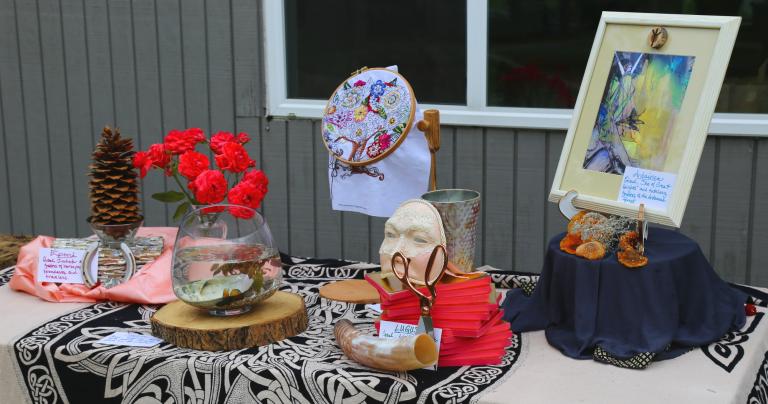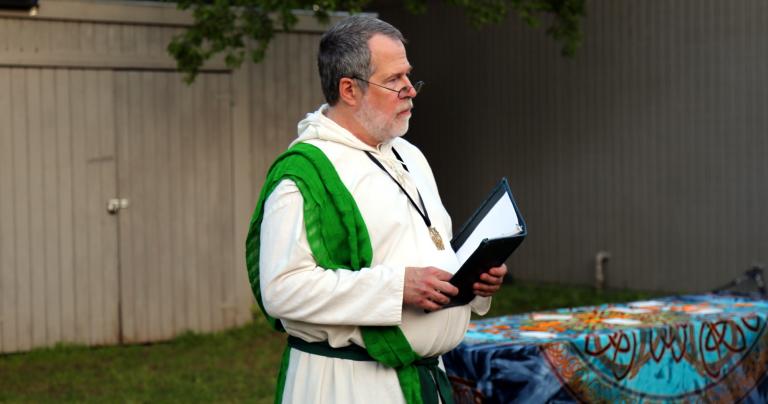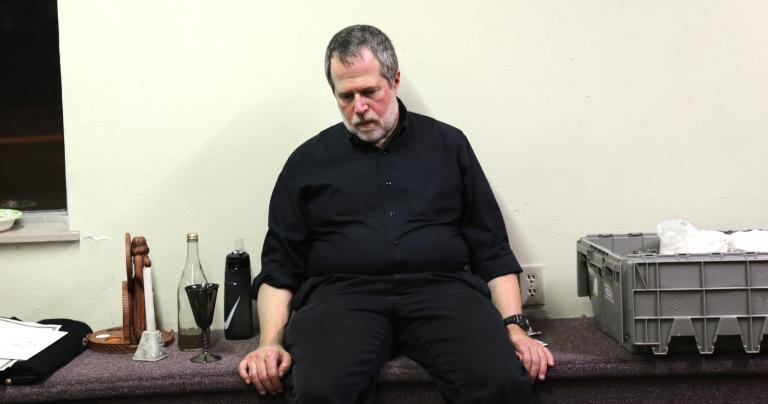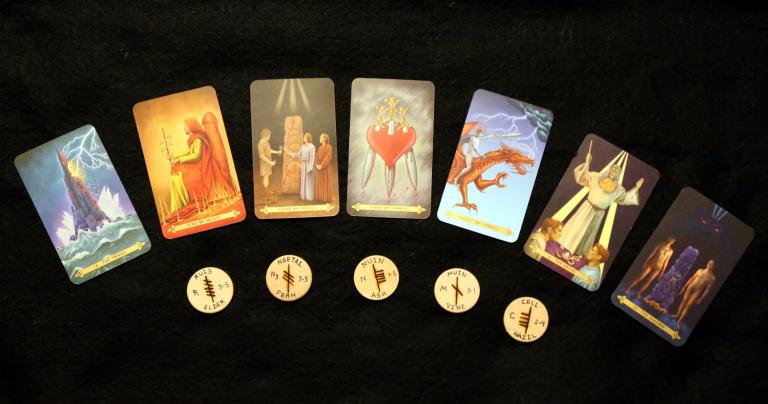The recent post Priesthood as Service to the Gods generated some very good discussion: a little here, some on my Facebook page, and even more on the pages of people and groups who shared it. Most of that discussion was in general agreement that we have yet to define what a Pagan priest is and isn’t, and what we expect them to do. And we don’t know what to call them.
This is part of what we lost when our ancestors converted – or were converted – from their indigenous religions to Christianity, or in some cases to Islam. We lost the traditions, we lost the infrastructure, and we lost the vocabulary.
Is “priest” even the right word? It’s not wrong – it’s an English word meaning “consecrated religious specialist” and it fits in the context of many different religions. But it carries assumptions that may not be accurate, and that we may not want.
In this post I’d like to start talking about the elements of priesthood and other sacred callings. So I went back to my original post and then surveyed all the comments on it I could find. I pulled out all the titles, tasks, duties, and responsibilities I saw, then I combined the roles that make sense to me.

A polytheist context
Buddhists don’t use the same structure of religious specialists as Christians. Catholics don’t use the same as Protestants, and Baptists don’t use the same as Lutherans. Our many Pagan traditions are no different.
What I present here is done in the context of the polytheist religion that I practice. There’s no precise name for this tradition – yet – so I call it ancestral, devotional, ecstatic, oracular, magical, public, Pagan polytheism. The structures I’m proposing will be more or less relevant to you to the extent that your path is more or less similar to mine.
Also, I use “priest” as inclusive of all genders, as do most polytheists. The work is mostly gender-irrelevant.
And now the 15 roles of Pagan priesthood.
1. Shrine keeper
Many Pagans and even more polytheists already keep shrines: places of devotion and worship, usually centered around a statue or other image of a deity. People who are considered priests tend to do this more formally and regularly.
2. Sacrificer
Very few Pagans and polytheists practice blood sacrifice. I’m not one of them, so all I’ll say is that expert hands-on training is required to do it right. If you don’t have that training you shouldn’t do it, period.
But we make other sacrifices and offerings: food and drink, artwork, and other objects of value. As with so much in Paganism and in magic, intent isn’t everything – doing it right matters. We need people who are trained and experienced in making sacrifices.
3. Mediator
Let’s be clear: you don’t need anybody’s help to pray to a God.
But sometimes you need to approach an unfamiliar deity and you need expert advice on the best way to do it. Or sometimes deity wants to speak to you and you won’t listen, so They send a human who can physically stand in front of you and say “the Morrigan says it’s time you got your act together.”
4. Worship leader
This is another title borrowed from Christianity, this time from contemporary non-liturgical churches. But I don’t have a better name for the people who compose and facilitate rituals.
Some of us create new rituals for every high day – you can do that when you only host eight services a year, and especially when you can spread the work around to multiple people. Others have a standard liturgy with only minor changes from ritual to ritual, like ADF’s Core Order of Ritual. Either way, somebody has to plan and lead them.
Writing rituals and leading rituals requires two separate skill sets. Ritual is in part sacred theater – the work of the writer and the director is different from the work of the performers.
5. Officiant
We expect our priests to officiate our rites of passage: child naming, coming of age, marriage, eldering, and funerals – plus anything else that comes up. That brings the power of tradition (in both meanings of the word: “our path” and “the way things have always been done”) to the rites and makes them more meaningful – and more real. Plus we expect they’ll have the expertise to do them well.
But you didn’t go to a temple priest to get married in ancient Egypt or Greece. In our time, many couples are choosing friends or relatives to officiate their weddings, which are often held in parks, back yards, or even barns. The idea of a “church wedding” is fading – are we sure we want to copy it?
6. Teacher
Who teaches the newcomers? For the past 50 years or so in the Pagan community, the answer has largely been “the authors.” And when I look at the authors on my shelf – especially the ones who’ve been most influential to me – I mainly see people who identify as a priest or priestess.
Do you have to be a priest to teach? Of course not – you just have to know the material and be able to teach it. But we expect that our priests to be especially knowledgeable and we expect them to be good presenters, so we often expect them to be teachers.
7. Counselor
This is another case of wanting what we see in Christianity – someone to talk to about our problems in life. Growing up in a Baptist church, the standard response was “go talk to the preacher and ask him to pray with you.” Mainline Protestant and UU ministers generally can provide some level of pastoral counseling, though they are not mental health professionals.
If you’re talking about how to connect to a specific deity or how to deepen your devotional practice, a polytheist priest probably is the best person to consult. If you need someone to listen with compassion or to offer some suggestions for dealing with the difficulties of life, maybe they are and maybe they aren’t.
8. Administrator
We expect our priests to manage the mundane affairs of our covens and groves. At least until they do something we don’t like, in which case they need to “quit trying to control people.”
Somebody has to maintain the website. Somebody has to arrange for places to hold public rituals. Somebody has to make sure the group does everything it says it’s going to do.
And somebody has to make sure the building is clean before you lock up after everyone else has already gone home.
Larger groups generally do a better job of spreading this work around – most of it doesn’t require the specific skills of a consecrated religious specialist. But there is still the impression that a priest is going to be the last one to leave at the end of the night.
9. Contemplative / monastic
I’ve had multiple requests for advice on Pagan contemplation and monasticism recently. I haven’t responded and I may not, because it’s not something I have much expertise with. Of all roles listed here, it’s my weakest.
Yet the fact that these questions are coming to me shows that – at least in part – we expect our priests to have some expertise with contemplative practices.
The Christian – and Buddhist – image of a priest living a life of simplicity and contemplation away from the ordinary world is strong in our mainstream culture. We could use similar traditions – and facilities – in our Pagan and polytheist religions. But contemplation and monasticism is a call of its own. It may occasionally intersect with the call to priesthood, but that’s the exception rather than the rule.
10. Community Servant
I’ve had devout, offering-pouring, Gods-worshipping polytheists tell me that community activism is a requirement of priesthood. We often expect Pagan priests to be political activists and advocates. We expect them to do the work done by Christian pastors visiting the sick and serving in prison ministries.
These are good things and a good religious community will do them, one way or another. But as with Christians, oftentimes we look to our leaders to represent us in community service mainly so we don’t have to.
There are elements of community service I perform because I’m called to do them. But this is work anyone can do – we should not outsource it to our priests.
11. Academic
The academics in a religious movement are the theologians, philosophers, historians, and researchers. This is work best done by people with secular training in the specific field of concern, many (most?) of whom are not priests.
Still, we expect priests to be knowledgeable on the history and theology of their traditions. That’s a reasonable expectation. It’s not reasonable to assume they’re experts.
12. Seer
These are the people who are skilled in communicating between this world and the Otherworld.
Oracles are the mouthpieces of the Gods. Sometimes this happens in ecstatic possession, but other times it’s a non-stop connection, like a speaker phone you can’t hang up.
Diviners are those skilled in reading Tarot, runes, bones, and various omens and auguries.
As with so many of these roles, this doesn’t require a priest, but we usually expect our priests to be good at it.
13. Bard
The vast majority of bards I know – be they musicians, poets, storytellers, or something else – explicitly reject the title of priest. But I will say that my bardic skills have greatly improved my priestly work. I’ll never be a musician, but I can pick out music to accompany a ritual. I’m a decent storyteller – those skills directly relate to leading rituals.
Do the writing skills of a bard help them in composing rituals? Yes – much of ritual is storytelling, and the skills are transferrable from one role to the other.
14. Magician
Based off years of observation, I would say that most magicians don’t consider themselves to be priests – certainly not a priest in a devotional relationship. Magicians – and witches – are mostly concerned with working magic to achieve a goal. Some aren’t very religious and a few are outright anti-religious.
But in our Pagan and polytheist religions, we expect our priests to be good magicians. This is especially true when we need a house cleansing or when we think someone is working magic against us and we need help.
15. Leader and Figurehead
I’ve avoided using the term “leader” so far. Leadership can come from any position or role. But we expect leadership from our priests, and we often look at them as figureheads in our movement, rightly or wrongly.
Most prominent Pagans I know accept their public-facing work as a necessity. A few simply refuse to do it – it causes them too much stress. And a few love it… sometimes too much.
How much can one person do?
Do you know anybody who’s an expert at all these things… other than Lugh Samildánach, that is? I’m certainly not.
But I’ve done all these things in my service as a priest. I’m very good at a few of them. I’m adequate with most. A few I’m barely passable. But I do them all when needed because they need to be done and somebody’s got to do them.
As our Pagan and polytheist religions grow, we will have more opportunities for specialization, and also more need for specialization.
Perhaps we can use the word “priest” to simply mean “consecrated religious specialist” – but then add what they specialize in. We would have liturgical priests and magician priests and counselor priests. Perhaps some traditions would expect their priests to be competent diviners, while others would expect some skill in counseling. There are many ways to divide up the work.
Toward a robust religious vocabulary
“Oh, you’re a Pagan priest – you must do elements 1, 4, and 6.”
“No, I’m a Pagan priest – I do elements 3, 8, and 9.”
Not only do we need to figure out what we want our priests to do, we need a bigger vocabulary for religious specialists.
But for the love of all the Gods, don’t go grabbing a word from a language you don’t speak fluently. You’re as likely as not to pick a word with inaccurate and perhaps embarrassing connotations. Our religious vocabulary will have to evolve organically – first we determine a role, then we find a name for it.
For now, let’s continue the conversation. What roles did I overlook? Can any of them be combined into one “job description”? Are there already good words for some of them?
Mainly, what do we want our consecrated religious specialists to do, and what should be the responsibility of the people in general?





















